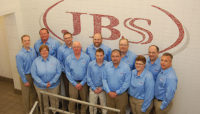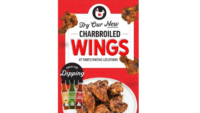Brand Magic
By Barbara Young, Editor-In-Chief
With a 122-year-old name behind its products, Madison, WI-based Oscar Mayer delivers the goods for its Kraft Foods parent.
Oscar Mayer wieners began wearing a yellow paper band bearing the company name and the U.S. government inspection stamp in 1929 to gain product distinction. A first in the meat industry.
Since then, the Madison, WI-based processed meats giant of the same name continued to innovate debuting its venerable Wienermobile in 1936, and introducing packaged sliced bacon and the first vacuum-package for sliced cold cuts in 1950s.
In the late ‘80s Oscar Mayer launched a revolutionary concept designed to replace bagged lunches and their hassle for working moms. Almost from the moment of its launch in 1988, Lunchables earned a place in the hearts of moms and kids across America. Moreover, Lunchables sailed through the next decade as one of the best-selling products in Oscar Mayer's history, while also triggering the company’s lunch combinations product category.
As a company, Oscar Mayer started life in 1883, when a man by the same name rescued a failing meat market on Chicago’s near North Side with the help of his brothers. Today, Oscar Mayer is part of Kraft Foods Global Inc., a $32 billion global food enterprise. Kraft’s North American operation, which generates $22 billion, is divided into five consumer-based sectors: U.S. beverages; U.S. cheese, Canada and North American foodservice; U.S. grocery; U.S. snacks and cereals; and U.S. convenient meals.
The convenient meals sector, which includes Oscar Mayer, along with the Pizza and Meals Divisions, generated annual sales of approximately $4. 3-billion in 2004 under Rick Searer, group vice president of Kraft Foods and president of the U.S. Convenient Meals Sector.
In a recent query, Searer answered questions concerning the status of his sector’s established business platforms, while also providing a glimpse into the performance of recent business initiatives.
Q: July is hot-dog month, a time for the spotlight to shine on this meat-industry category. How are hot dogs faring in the marketplace?
A: Although sausages have been around for centuries, the hot dog as we know it today, is only 100 years old. The challenge for us is to keep hot dogs as relevant for today’s consumers as they were 100 years ago. To accomplish this, we highlight the fun, convenience, and great taste hot dogs offer so consumers can see how hot dogs may fit in their harried lives.
Q: What is your approach?
A: We deliver on the trust and quality consumers have come to expect of the Oscar Mayer brand. As our commercial says, Oscar Mayer hot dogs are quality meat, no fillers – a claim we have used for over 20 years. While we researched to see if there is something more compelling, we keep coming back to that statement. It is that reassurance on quality, plus what our brand represents, that keeps Oscar Mayer hot dogs on top. Oscar Mayer has been around 122 years. You don’t maintain a leadership position more than 100 years if you don’t have trust. By delivering on that trust, we continue to be the top brand in several processed meat categories.
Q: Your responsibilities now cover more than branded meat. How are products in other categories performing, especially Lunchables?
A: Lunchables continues to be an important business for Oscar Mayer, representing an 80 percent share of the lunch combinations category. As part of our ongoing efforts to improve the nutritional profile, we are in the process of transforming Lunchables as a better-for- you option for today’s Gen X moms. Although the brand has not been growing as fast as it once did, it has been stable over the last three-to-four years, with incremental growth seen within the last four months.
Q: To what do you attribute the lack of growth?
A: As we look at it, there are two underlying factors. First, the nutritional expectations of today’s Gen X moms are different than when we introduced Lunchables in 1988 to baby boomer moms. Moms are more savvy about nutrition and have higher expectations for their child’s lunch options. Secondly, when we introduced Lunchables, kids did not have quite the broad range of fun and convenient, single serve options that exist today, such as pre-packaged sandwiches, yogurts in a tube, and squeezable peanut butter. Even children’s choices in schools are broader than before, with some school districts offering brand name pizzas and subs, which is interesting given that schools are also under pressure to improve the nutrition of what they serve.
Q: How are you transforming the product?
A: We are taking steps to make Lunchables a better choice for moms and her kids. There are about 50 items in the Lunchables line and we have improved the nutritional profiles of every single one of them concerning calories, fat, saturated fat, and sodium. That was phase one.
Now we are literally transforming the line, recipe by recipe, as well as introducing new items in an effort to satisfy moms’ desire for a different nutritional profile. At the same time, we need to make sure it remains cool and appealing to kids. To that end, we introduced the first chicken nugget offering in the category with our Chicken Dunks last year, and Chicken Shake Ups this year. To date, Chicken Dunks are the number– one selling item in the line.
Q: Is a line extension in the offing?
A: We are looking to grow our presence in the lunch combinations category with the introduction of Kraft’s new South Beach Diet items for diet savvy women. These include wraps, pizzas, entrées, cereal and cereal bars.
The South Beach Diet wraps are developed in the Oscar Mayer division and we are using learnings from the Lunchables technological and operations platforms to create the wraps. Consequently, our meals division handles the entrées; pizza is developed through the Pizza group; and we are coordinating with our cereal division on cereal and cereal bars. To date, the South Beach Diet line is doing very well.
Q: What are the notable strengths of this Kraft business unit?
A: We have brands the consumer trusts. In terms of how can we win in today’s very challenging and changing marketplace, we must ensure that our brands are relevant to consumers and distinguish us from a number of other companies in the meat industry. That is our starting focus every time. We are a branded consumer packaged good company. Even at Oscar Mayer, we don’t think of ourselves as the meat company within Kraft. We think of ourselves as a consumer packaged goods company that focuses on protein-based convenient meal solutions.
We also benefit from the synergies we lever from one division to the next in this sector. NP


Report Abusive Comment